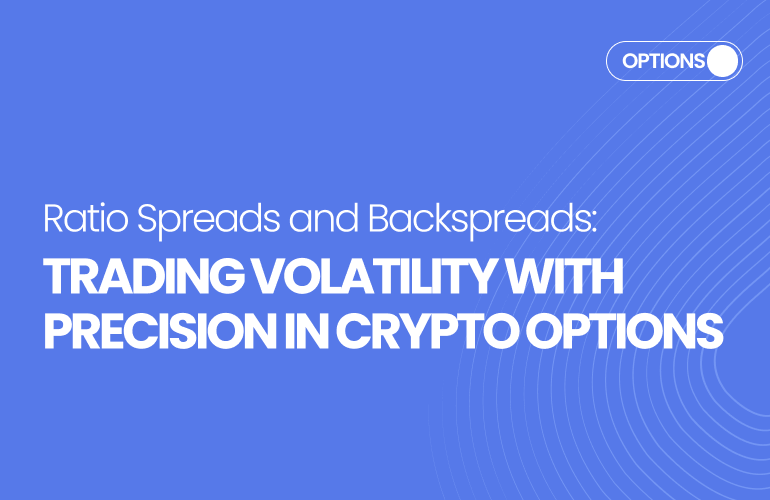In crypto options trading, volatility isn’t just a risk—it’s an opportunity. While basic strategies like buying calls or puts work in clear trends, advanced traders use ratio spread option strategy and backspread option strategy to fine-tune volatility exposure and capture asymmetric payoffs.
These approaches are often considered more effective than basic spreads because they let you manage both risk and reward with precision.
What Are Ratio Spreads?
A ratio spread option involves buying one option and selling multiple options of the same type (usually 2), at different strike prices.
- Typically set up as 1:2 (buy one, sell two)
- Can be done with calls (bullish) or puts (bearish)
Goal: Profit from limited movement in the underlying OR capitalize on a specific directional move with reduced cost.
Example: Call Ratio Spread (Bearish to Neutral)
- Buy 1 BTC $60K Call
- Sell 2 BTC $65K Calls (same expiry)
If BTC rises slightly, the short calls decay faster than the long call, generating profit. If BTC rises too much, the naked extra short call leads to large potential losses.
- Max Profit: If BTC closes at $65K
- Risk: Unlimited above the higher strike (because of extra short call)
When to Use a Ratio Spread Option Strategy
- You expect mild movement or limited volatility
- You want a low-cost or credit entry
- You’re comfortable managing naked short option risk
Crypto Use Case: Let’s say BTC is trading at $60K and you think it might rise to $64K but not beyond. A call ratio spread lets you structure this view cheaply, while still profiting from a controlled rally.
What Are Backspreads?
A backspread option strategy is the inverse of a ratio spread. You sell one option and buy more of the same type (usually 2).
- Typically a 1:2 or 1:3 ratio
- Can be call-based (bullish volatility) or put-based (bearish volatility)
Goal: Benefit from explosive moves with limited or zero cost entry
Example: Call Backspread (Bullish on Volatility)
- Sell 1 BTC $60K Call
- Buy 2 BTC $65K Calls (same expiry)
If BTC surges past $65K, the two long calls gain exponentially. If BTC stays below $60K, you keep the net credit.
- Max loss: Limited to the difference between sold and bought premiums if price stays in range
- Max gain: Unlimited upside if the market moves significantly
When to Use a Backspread Option Strategy
- You expect big directional move or volatility spike
- You want asymmetric upside with limited downside
- Perfect for event-driven trades (e.g., ETF approvals, macro news)
Backspreads are also favored in crypto because they let traders profit from volatility without putting too much capital at risk.
Comparing Ratio Spreads vs Backspreads
| Feature | Ratio Spread | Backspread |
|---|---|---|
| Net Premium | Usually credit or low debit | Usually debit or zero-cost |
| Risk Profile | Risky if market overshoots | Limited risk, high reward |
| Best Use Case | Range-bound to mild trend | High-volatility breakouts |
| Ideal For | Advanced traders who can manage risk | Traders seeking explosive upside |
Knowing the difference between ratio spreads vs backspreads helps traders choose between risk-managed plays and high-reward volatility strategies.
Risk Management Tips
- Always define breakeven points before entering the trade
- Use spreads with liquid strike prices to avoid wide bid-ask slippage
- Consider adding hedges for the naked leg in ratio spread in options
- Monitor implied volatility (IV): both strategies are sensitive to changes in IV
One common ratio spread example is combining a short call with two long calls to cap downside while keeping upside potential intact.
Strategy Execution on Pi42
With Pi42’s intuitive options terminal:
- Select BTC, ETH, or SOL as your underlying
- Use the Options Strategy Builder to simulate ratio and backspread payoffs
- Adjust strikes, expiries, and quantities visually
- Preview max profit/loss before executing the trade
Pi42 also supports real-time delta and gamma tracking, so you can monitor how the position evolves as market moves.
Conclusion: Trade Smarter with Volatility Strategies
Backspread option strategy and ratio spread option strategy let you turn crypto market volatility into opportunity—whether you’re betting on calm consolidation or explosive moves. With the right setup, you can profit from directional views while controlling risk and managing premium exposure.
Try ratio and backspread strategies on Pi42 today using our built-in strategy simulator.
Trade volatility with precision—and profit with confidence.
Keep Learning:
Difference Between Options and Futures: Explained for Crypto Traders
Crypto Market Making: What is it & How it Works
When to Exit Options Trades: Smart Strategies for Crypto Traders

